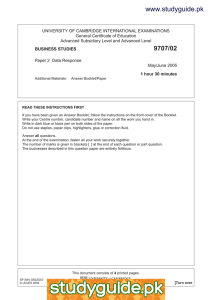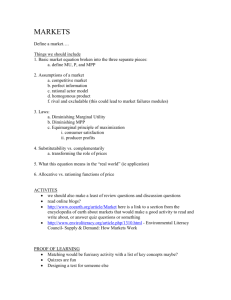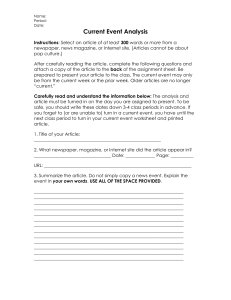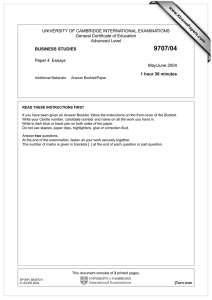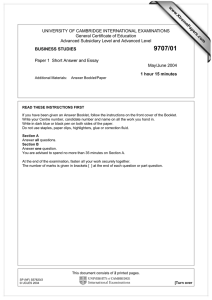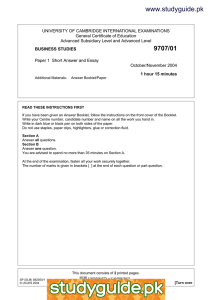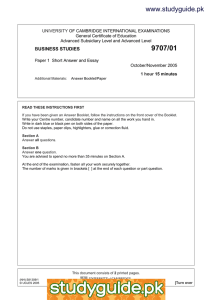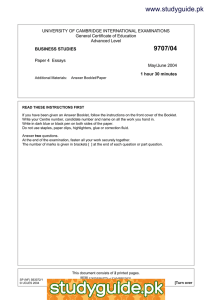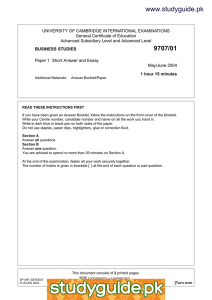UNIVERSITY OF CAMBRIDGE INTERNATIONAL EXAMINATIONS General Certificate of Education www.XtremePapers.com
advertisement
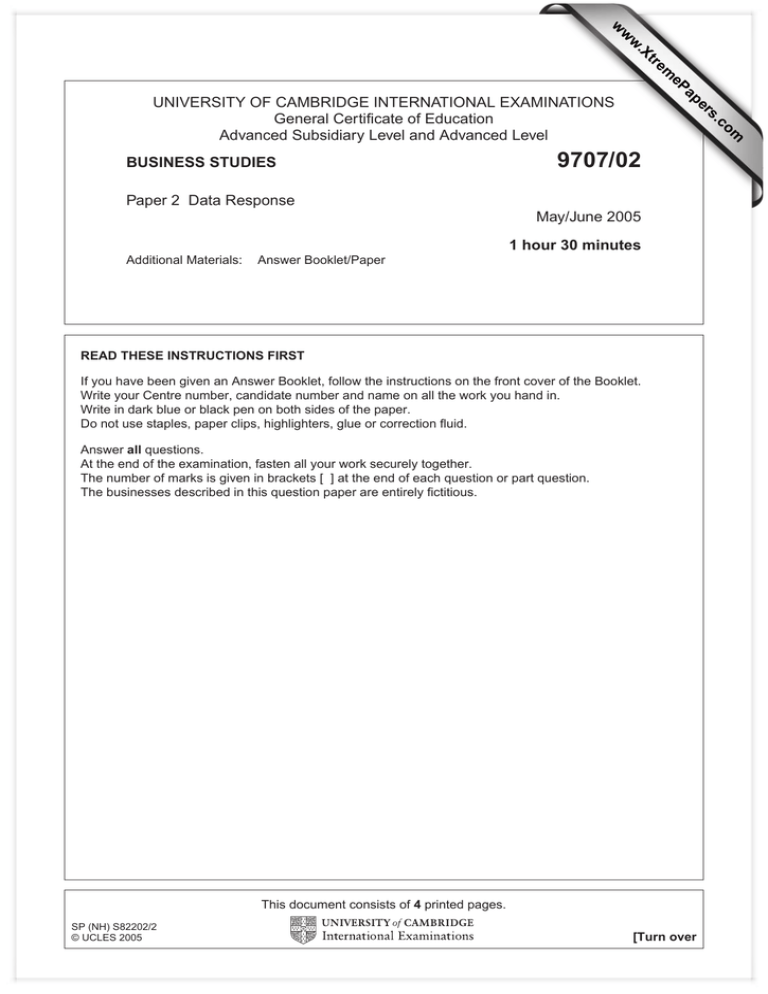
w w ap eP m e tr .X w om .c BUSINESS STUDIES s er UNIVERSITY OF CAMBRIDGE INTERNATIONAL EXAMINATIONS General Certificate of Education Advanced Subsidiary Level and Advanced Level 9707/02 Paper 2 Data Response May/June 2005 1 hour 30 minutes Additional Materials: Answer Booklet/Paper READ THESE INSTRUCTIONS FIRST If you have been given an Answer Booklet, follow the instructions on the front cover of the Booklet. Write your Centre number, candidate number and name on all the work you hand in. Write in dark blue or black pen on both sides of the paper. Do not use staples, paper clips, highlighters, glue or correction fluid. Answer all questions. At the end of the examination, fasten all your work securely together. The number of marks is given in brackets [ ] at the end of each question or part question. The businesses described in this question paper are entirely fictitious. This document consists of 4 printed pages. SP (NH) S82202/2 © UCLES 2005 [Turn over 2 1 Matpack Packaging plc Matpack Packaging PLC (MPP) manufacture plastic packaging for industry. Their customers include food manufacturers and cosmetics firms. MPP have approximately 500 employees in each of four different countries with a similar factory in each country. Working conditions vary from country to country. MPP have always followed the employment practices of each of the countries in which they operate. In one country, they follow very strict rules and regulations governing working conditions. These regulations include a minimum wage, a maximum number of working hours as well as extensive non-financial motivators for all employees. In another country, MPP work within very few rules and regulations so there are far fewer benefits for employees. Employees are now demanding equal working conditions and benefits in all MPP factories. Technology is changing rapidly in the packaging industry. As well as new types of machinery becoming available, MPP also have to consider new packaging materials. For example, MPP’s Research and Development team have developed an environmentally friendly type of food packaging. This is much more expensive to make and will need new machinery. MPP might be able to sell the new product at a high price. This could make it more profitable than other types of food packaging. However, MPP will need to introduce better quality control. John, MPP’s accountant, has been assessing the possible impact of the new product on the company’s profits. He estimates next year’s profits, before the new product is introduced, as: 5 10 15 20 Forecast Profit and Loss Account 2006 ($million) Sales Cost of goods sold Gross Profit Expenses Depreciation Net Profit 20 13 7 1 2 4 Net profit margin = 20% 25 30 If MPP introduce the new packaging product, John expects the following changes: • • • • © UCLES 2005 Sales up $12m Cost of sales up $6m Expenses up $1m Depreciation up $1m 35 9707/02 M/J/05 3 (a) Explain the following terms: (i) non-financial motivators (line 9) [3] (ii) quality control (line 19). [3] Calculate the forecast net profit for 2006 if the new product is introduced. [2] (ii) Calculate the net profit margin after the new product is introduced. [2] (iii) How might John use the result in (ii)? [2] (b) (i) (c) Analyse the marketing factors that MPP should consider when launching the new product. [8] (d) Discuss whether MPP should introduce the same working conditions and benefits in all of its factories. [10] QUESTION 2 IS PRINTED ON THE NEXT PAGE. © UCLES 2005 9707/02 M/J/05 [Turn over 4 2 Our News Ltd Shepherd and Lucky own and manage Our News Ltd, a newspaper publishing business. The business produces a daily local newspaper. The business has recently experimented with a monthly colour magazine aimed at teenagers and young people. The plan is to stop publishing the daily newspaper and produce only the monthly magazine. Initial secondary market research results suggest the magazine will be very popular with advertisers. Shepherd, who manages the business’s finances, is enthusiastic about the new magazine. ‘We will make bigger profits from this new product,’ he said. ‘Although we will need to invest in new technology, some employees will have new job opportunities and will develop new skills.’ 5 10 Shepherd has been looking at recent national sales data: Figure 1 Figure 2 National Sales – Daily Newspapers $m National Sales – Monthly Magazines $m 100 80 Sales 60 Advertising revenue 40 20 Total revenue 0 2000 2002 Revenue (£m) Revenue (£m) 100 80 Sales 60 Advertising revenue 40 20 2004 Total revenue 0 2000 2002 2004 Shepherd thinks that before the business decides to produce a monthly magazine, more market research will be needed. Lucky has human resource management as one of her management functions. She is concerned that changing to the monthly magazine will have an impact on employees. Lucky knows that many of the staff are worried that the new technology needed for the monthly magazine will make some employees redundant, while for other jobs employees do not have the necessary skills. 15 (a) Explain the following terms: (i) secondary market research (line 5) [3] (ii) human resource management (line 14) [3] (b) (i) Calculate the percentage (%) change in total revenue of monthly magazines from 2002 to 2004. [2] (ii) Outline additional market information Our News Ltd would find useful before taking the decision to produce the monthly magazine. [4] (c) Analyse how Lucky might manage the human resource problems that could result from changing from a daily newspaper to a monthly magazine. [8] (d) Evaluate the decision of Our News Ltd to replace the daily newspaper with the monthly magazine. [10] Permission to reproduce items where third-party owned material protected by copyright is included has been sought and cleared where possible. Every reasonable effort has been made by the publisher (UCLES) to trace copyright holders, but if any items requiring clearance have unwittingly been included, the publisher will be pleased to make amends at the earliest possible opportunity. University of Cambridge International Examinations is part of the University of Cambridge Local Examinations Syndicate (UCLES), which is itself a department of the University of Cambridge. © UCLES 2005 9707/02 M/J/05
